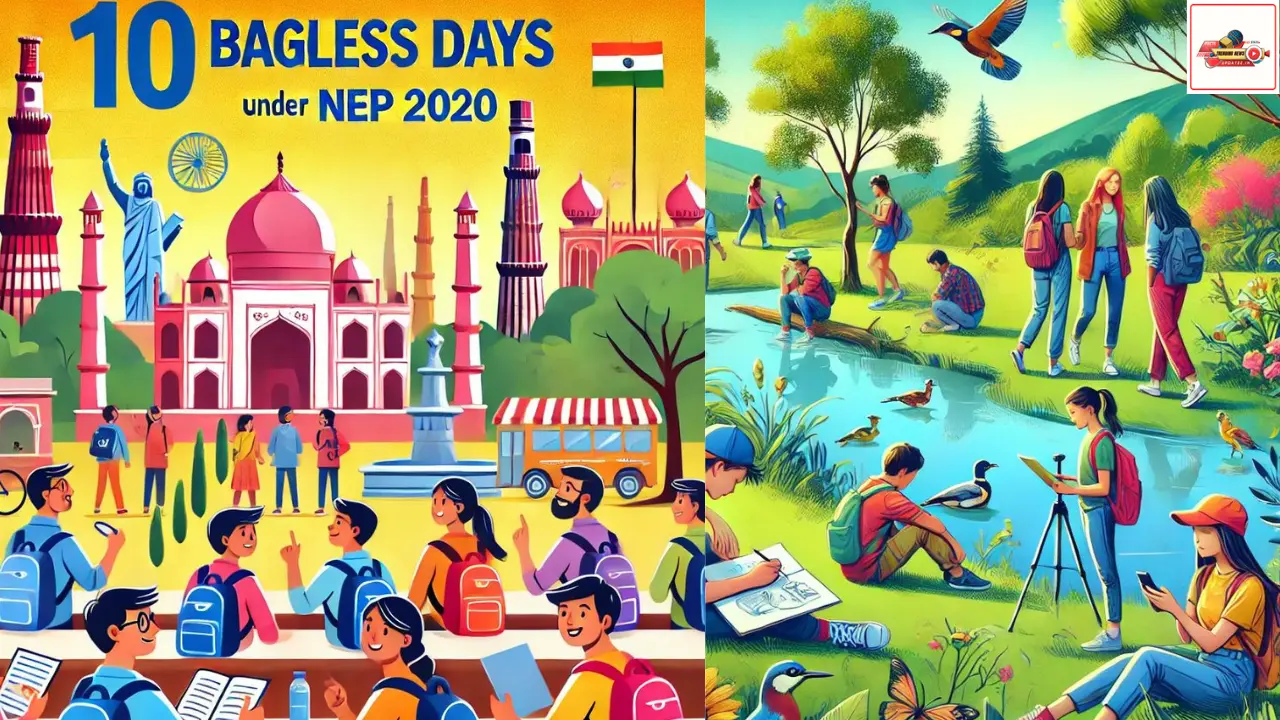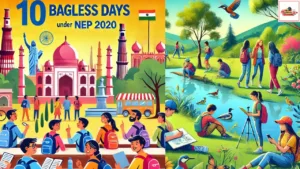
10 Bagless Days:

The National Education Policy (NEP) 2020 is famous for introducing an idea known as “10 Bagless Days” which focuses on boosting students’ practical learning in grades 6-8. The National Council of Educational Research and Training (NCERT) and one of its departments, PSS Central Institute of Vocational Education (PSSCIVE), manage this programme whose main objective is to increase the extent to which learners feel connected with what they learn besides making it fun without any burdens of carrying books around while at school for ten days annually during school sessions.

Objective and Vision:
The main point of the “10 Bagless Days” project is to engage students in practical activities that encourage creativity, critical thinking, and real-world skills as opposed to just sitting in the classroom. It’s about steering clear of textbooks and normal modes of teaching so that through this initiative pupils can focus on what really interests them as well as find out more about their neighbourhoods and how they relate with nature in general.
This program is consistent with the larger objectives of the New Education Policy 2020 to offer all-round and all-inclusive education. Primarily, its objective is to provide learners with various vocation skills thereby linking theoretical education to practical life. Moreover, this program stresses the need for understanding local ecologies and how they are all related in different fields of knowledge.

Activities and Implementation:
One of the objectives of the “10 Bagless Days” campaign is to involve students in various educational events. The activities have been selected to match the educational goals and the culture of the target population. This include:
Environmental Awareness: Here, agenda for the day may include exercises to check water purity; making orders for birds; identifying local plants and animals among others with sight of making them appreciate what they have got and try to conserve it.
Cultural and Historical Exploration: In plans cultural heritage to help students understand local monuments, museums and historical sites be visited. This will involve interactions with local artists and craftsmen, hence exposing students to traditional arts and crafts.
Vocational Training: For the program to be complete, it must include attachments with local experts on skills like carpentry, gardening or pottery. These practical experiences bring out any student’s potential in different trades hence build respect for work done by hands.
Creative and Recreational Activities: Making kites, arranging book weeks and engaging students in sport activities will be the alternative events during this duration of time. These are primarily meant for enhancement of teamwork spirit as well as creativity at large including keeping fit.

Activities will reduce the pressure of completing the syllabus:
During this period, instructions have been given to take students on short trips to historical, cultural or touristic places as a learning activity outside the school. The Education Ministry has said that trips or activities outside the school will reduce the pressure on children to study from books and complete the syllabus.
Impact and Future Directions:
To improve academic quality and focus meaningful experience for pupils the Ministry of Education inspected and enhanced the “10 Bagless Days” guidelines. Through this move, there will be increased learning experiences among pupils as they explore their talents, acquire skills that are relevant to their day-to-day lives and understand more about things around them.
The aim of the program is not only to make learning more enjoyable, but also to expose students to a variety of disciplines and professions in order to prepare them for future careers. It is also a way of creating a more flexible and adaptable education system that can respond effectively to the different requirements and goals set by students.
This project will redefine the field of education in India by offering an alternative way through experience-based learning, making it more significant, contextual and oriented toward the twenty-first century capabilities required.

The National Council for Educational Research (NCERT) has issued guidelines for 10 bagless days for students. These guidelines have been prepared by NCERT’s vocational education body – Pandit Sundarlal Sharma Central Institute of Vocational Education. In 10 days, students will learn new skills through different activities and will be able to consider many options for their career.











